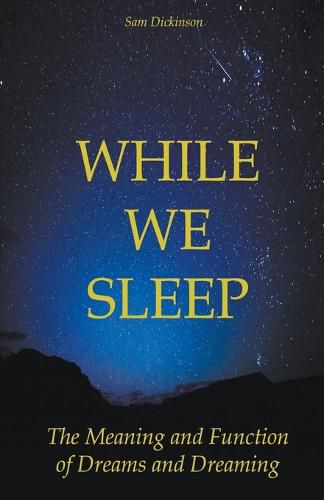Readings Newsletter
Become a Readings Member to make your shopping experience even easier.
Sign in or sign up for free!
You’re not far away from qualifying for FREE standard shipping within Australia
You’ve qualified for FREE standard shipping within Australia
The cart is loading…






This title is printed to order. This book may have been self-published. If so, we cannot guarantee the quality of the content. In the main most books will have gone through the editing process however some may not. We therefore suggest that you be aware of this before ordering this book. If in doubt check either the author or publisher’s details as we are unable to accept any returns unless they are faulty. Please contact us if you have any questions.
Whether you remember them or not, dreams are a normal part of sleep. Everyone dreams for a total of about two hours per night, and dreams can occur during any stage of sleep, although they're most vivid during the REM phase. Suppose you've ever woken up from a happy dream feeling relaxed and rested or a scary one feeling on edge. In that case, you might have wondered whether the content of your shut-eye reveries can make a difference in your overall sleep quality.
Dream content often relates back to what's happening in your waking life. If you're experiencing low stress and plenty of satisfaction in your day-to-day life, you may have more positive dreams. By contrast, if you're depressed or anxious during the day, you may have more unpleasant dreams and compromised sleep quality at night.
The good news is that while you cannot control your dreams directly, you can work on improving your state of mind during the day.
This book investigates theories concerning the function of dreams and dreaming, starting with the contributions made by Freud to the present day. Several ideas within psychodynamic, evolutionary, and neurocognitive perspectives are presented and discussed in light of relevant empirical research. These include theories that postulate that the function of dreaming is to guard sleep and approaches which propose that dreaming poses an adaptive advantage either by allowing for the simulation and rehearsal of threat avoidance behaviors, practicing social skills, solving emotional or intellectual problems, or aids us in the consolidation of memories.
$9.00 standard shipping within Australia
FREE standard shipping within Australia for orders over $100.00
Express & International shipping calculated at checkout
This title is printed to order. This book may have been self-published. If so, we cannot guarantee the quality of the content. In the main most books will have gone through the editing process however some may not. We therefore suggest that you be aware of this before ordering this book. If in doubt check either the author or publisher’s details as we are unable to accept any returns unless they are faulty. Please contact us if you have any questions.
Whether you remember them or not, dreams are a normal part of sleep. Everyone dreams for a total of about two hours per night, and dreams can occur during any stage of sleep, although they're most vivid during the REM phase. Suppose you've ever woken up from a happy dream feeling relaxed and rested or a scary one feeling on edge. In that case, you might have wondered whether the content of your shut-eye reveries can make a difference in your overall sleep quality.
Dream content often relates back to what's happening in your waking life. If you're experiencing low stress and plenty of satisfaction in your day-to-day life, you may have more positive dreams. By contrast, if you're depressed or anxious during the day, you may have more unpleasant dreams and compromised sleep quality at night.
The good news is that while you cannot control your dreams directly, you can work on improving your state of mind during the day.
This book investigates theories concerning the function of dreams and dreaming, starting with the contributions made by Freud to the present day. Several ideas within psychodynamic, evolutionary, and neurocognitive perspectives are presented and discussed in light of relevant empirical research. These include theories that postulate that the function of dreaming is to guard sleep and approaches which propose that dreaming poses an adaptive advantage either by allowing for the simulation and rehearsal of threat avoidance behaviors, practicing social skills, solving emotional or intellectual problems, or aids us in the consolidation of memories.